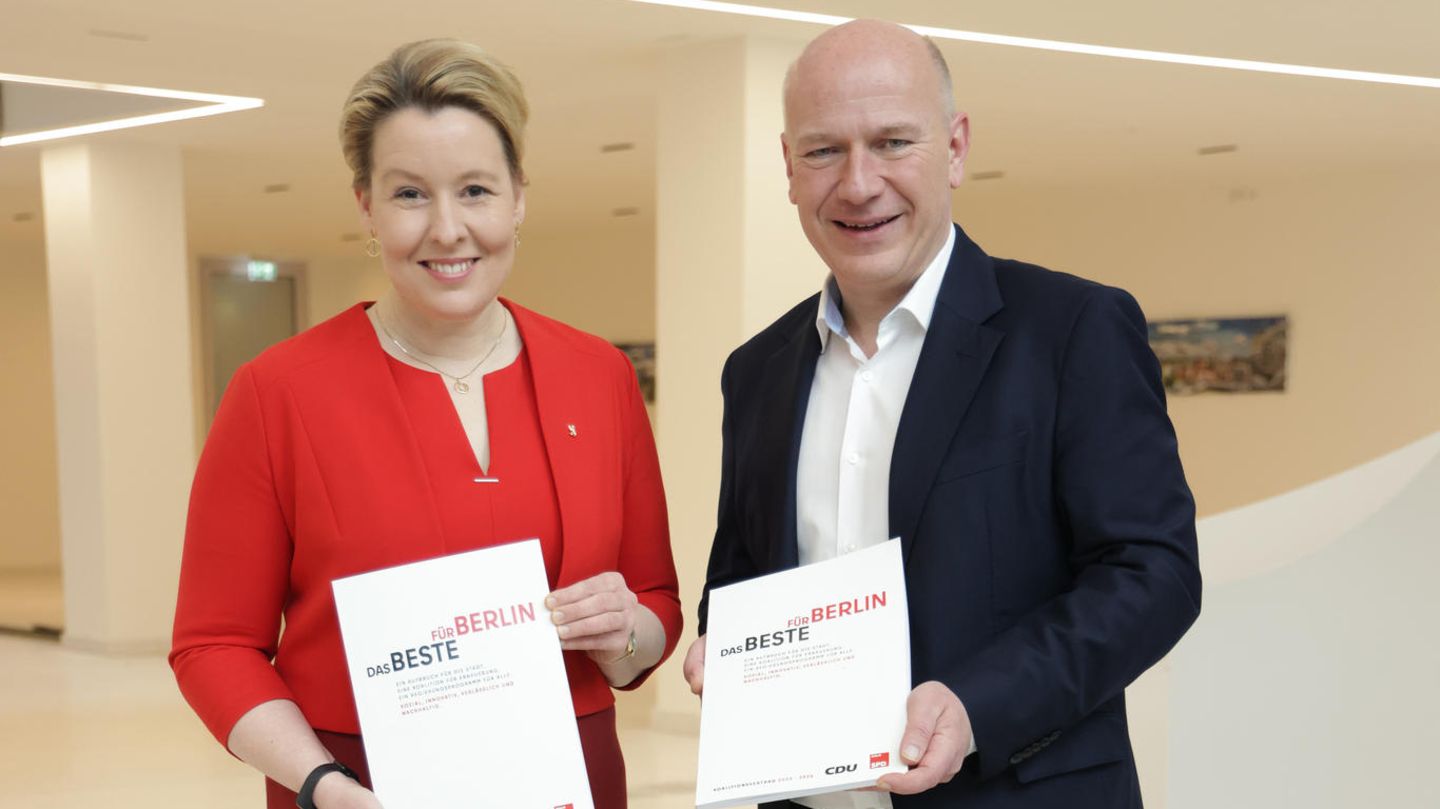
After three weeks of negotiations, the coalition agreement between the CDU and SPD is in Berlin. In the presentation, both parties show great harmony. The SPD leadership around Giffey now has to explain the entire work to their base.
No more “authority ping-pong”, better police equipment and a boost in housing construction: the planned black-red coalition in Berlin wants to get the capital, which recently even had to repeat an election due to many mishaps, to run better and provide more security.
“We want a new start for the city and we want renewal,” said the expected future governing mayor Kai Wegner (CDU) on Monday at the presentation of the coalition agreement, which was negotiated within a good three weeks and is entitled “The best for Berlin”. The city needs to work better. The previous head of government Franziska Giffey (SPD), who is to take over a senator post in the new state government, spoke of a “change of direction”. Revision STERN PAID 27_21 Expensive blood 10.00
There is great ambition when it comes to climate protection
In transport policy, too, the future coalition members are distancing themselves from the previous coalition of SPD, Greens and Left, which was formed for the first time in 2016 and renewed in 2021. They want to advance the traffic turnaround with an expansion of public transport, shorter intervals and new rail routes, and there will also be new cycle paths. “But we also want to ensure that people with cars still have their place in this city,” said Wegner. Many depend on it. He spoke of a “mobility turnaround with offers instead of bans”.
When it comes to climate protection, the CDU and SPD seem to want to overtake the Greens. They are planning a special fund of five to ten billion euros in order to advance energy renovation, mobility conversion and the switch to renewable energy. According to Wegner, climate protection is a “top issue”. The program is unique nationwide. Giffey described climate protection as a key issue for the future. “Berlin should be a pioneer on the way to becoming a climate-neutral city.”
With regard to the colorful multicultural city of Berlin, black and red strikes tones that not everyone expected – especially not after the recent New Year’s Eve riots and the subsequent heated debate about perpetrators with a migration background. “Berlin is an international, cosmopolitan, colourful, diverse metropolis,” said Wegner. It has to stay that way and be protected. “Because in this city everyone is happy in their own way, no matter where they come from, no matter what they believe, no matter who they love.”
Management should become more efficient
Both parties want to move forward with a central project as soon as they take over government: a comprehensive reform of the administration in Berlin, which is often characterized by inefficiency and a confusion of competences. The aim is faster appointments for people at the Citizens’ Registration Office, clearer responsibilities between the state level and the districts and an acceleration of the procedures. Setting up a zebra crossing should therefore no longer take years and involve various authorities and working groups in 18 procedural steps.
In the new state government, the CDU and SPD each take over five senate administrations (ministries). In addition, the CDU has the executive chair in the town hall. Giffey saw the allocation of departments as proof that both parties wanted to govern together “on an equal footing”. The CDU won the parliamentary elections in February with a good 28 percent, around ten points ahead of the SPD.
Before the new black and red Senate can get started, there are still two hurdles to overcome. The SPD will start a member vote on Tuesday, the result of which will be announced on April 23 – in about three weeks. A day later, the CDU decides on the government program at a party conference. On April 27, CDU state leader Wegner is to be elected head of government in the House of Representatives, and he will appoint his senators immediately afterwards. Which person will take over which position, including Giffey, should only be announced shortly beforehand.
Nobody believes in failure
Few believe that the Schwarz-Rot project will still fail at the party base, although there was resistance to it, especially in the SPD. There, a number of members and the Jusos had advocated continuing the three-party coalition with the Greens and the Left. Such an alliance would still have had a majority in the new House of Representatives. SPD leader Giffey could even have remained governing mayor in this coalition.
But she decided, together with the rest of the party leadership, to form a coalition as a junior partner with the election winner, the CDU – and hopes that the coalition agreement that has been negotiated will appease those within the party who criticize this change. The SPD can now present its members with a complete work “that is more than we had before,” said Giffey.
